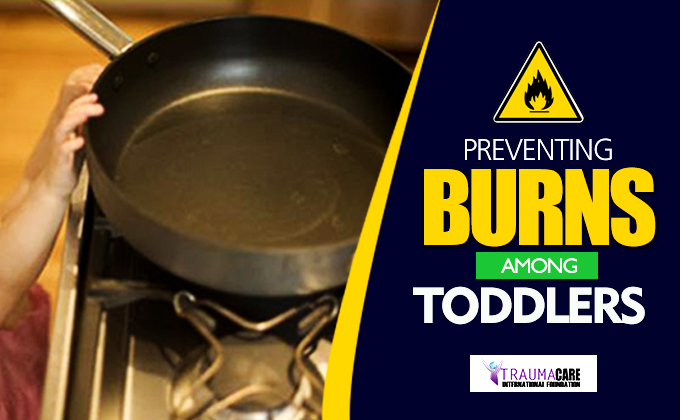A toddler is a child between 12 to 36 months old and their safety at this stage is very important. Learn more about preventing burns in toddlers at home in this post
A toddler is a child between 12 to 36 months old and their safety at this stage is very important.
This period is essential for their cognitive, emotional and social development
Many ordinary things in a home — including bath water, food, and electrical outlets — can cause childhood burns.
To prevent burns at home:
:: Reduce water temperature. Check the temperature of bathwater with your hand before putting your child in the bath.
:: Avoid hot spills. Don't cook, drink or carry hot beverages or foods while holding a child. Keep hot foods and liquids away from table and counter edges.
:: Don't use tablecloths or place-mats, which young children can pull down.
:: Establish 'no' zones. Block access to the stove, fireplace, space heaters and radiators.
:: Don't leave a child unattended in a room when these items are in use. Keep hot devices out of reach.
:: Store items designed to get hot, such as clothes irons or curling irons, unplugged and out of reach.
:: Test food temperature before feeding young children. Be careful with food or liquids warmed in a microwave, which might heat foods unevenly.
:: Never warm a baby's bottle in the microwave. Choose a cool-mist humidifier or vaporizer. Cool-mist humidifiers prevent steam burns and hot-water spills.
:: Address outlets and electrical cords. Cover unused electrical outlets with safety caps. Inserting a fork, key or other metal objects into an outlet could result in an electrical burn.
:: Keep electrical cords and wires out of the way so that children don't chew on them. Replace damaged, brittle or frayed electrical cords. Don't run cords under rugs or carpets.
:: Choose fire-resistant fabrics. Check labels to make sure mattresses and pajamas meet federal flammability standards.
To protect children from outdoor hazards:
:: Watch grills and fire pits. Don't let children play near grills, fire pits or campfires.
:: Check car seats. Before placing your child in a car seat, check for hot straps or buckles. If you park in direct sunlight, cover the car seat with a towel or blanket.|
:: Avoid backyard fireworks. Don't let children play with or near fireworks or sparklers.
To prevent accidental fires:
:: Turn the handles of your pots and pans toward the rear of the stove and use back burners when possible. Don't leave the stove unattended when you're cooking.
:: Lock up matches and lighters. Store matches and lighters in a locked cabinet or drawer. Teach children that matches and lighters aren't toys.
:: Use space heaters wisely. Keep space heaters at least 3 feet (about 1 meter) away from bedding, drapes, furniture and other flammable materials. Never leave a space heater on when you go to sleep or place a space heater near someone who's sleeping.
:: Keep your fireplace clean. Annual cleaning of a fireplace and chimney can help prevent a chimney fire.
:: Store flammable materials. Store securely flammable liquids in original containers.





What do you think?
0 Responses
To Comment, you must Sign In
Be the First to Post on this Topic